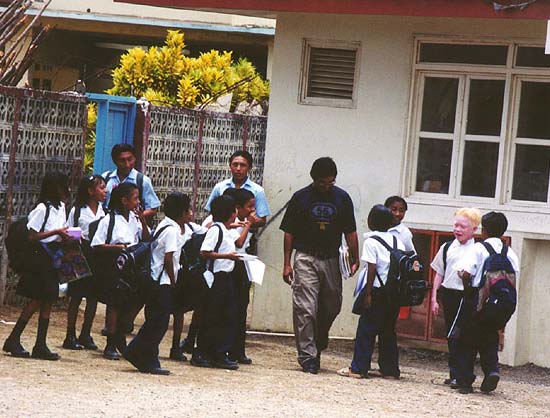
Dorothy Rivers says Volunteers in the front lines of neo-colonialism
Volunteer work
Getting your hands dirty, working for low wages but supporting practical change for the better in the Third World must have crossed the mind of most NI readers.’ Volunteers are often accused of, at best, getting a free lunch and, at worst, being modern imperialists.
Ex-volunteer, Canadian teacher Dorothy Rivers provides a guide to non-imperialist voluntary work.
In 1976, Graham Greene was travelling through rural Panama. President Torrijos, a friend of Greene’s, was locked in a struggle with the US. Torrijos wanted the canal zone returned to Panamanian control. Greene encountered a group of peasants in a poor area near Las Minas and asked them what they thought of their President.
‘Half good and half bad’, was the reply.
‘What is the bad half?’
‘He doesn’t like the gringos’
‘Why do you like the gringos?’
‘We met a gringo. He was a good man, and he taught us many things. He drank with us,’ Torrijos had earlier expelled the Peace Corps from Panama, but at least one of them had made converts.
That was ten years ago. The debate about volunteers was already three years old in the NI. Volunteers were ‘killing with kindness’ said Marie-Helene Matthews in the July 1973 issue. The more competent and sincere their efforts were, the better they served as screens for the failure of their home countries to do anything significant to combat underdevelopment. The best work of volunteers counted for nothing when compared to the perpetuation of unfair trade practices, the failure to transfer sufficient capital to generate self-sustaining development, vast military spending and the active destabilization of any Third World government which threatened Western commercial interests.
Moreover, volunteers themselves were often in the front lines of neo-colonialism. They moved easily into the jobs, houses, and social circles of the recently departed colonialists. They filled the schools and hospitals, skewing development plans towards the emerging elites and away from the poor. They served as role models for their local friends and students, creating consumerist values and desire for western products. As Ivan Illich put it, they transformed thirst into the need for Coca Cola.
One old India hand remarked to me at the time ‘Colonialism is not dead; it’s just wearing its hair longer’.
But not all volunteers are agents of imperialism. The early critics of international volunteerism were the volunteers themselves. One walked out of his job at Tanzanian technical school and went to work as a radio technician in liberated areas of Angola. When he returned home he worked tirelessly for the Angolan liberation struggle. Others chose less dramatic responses. A returned volunteers movement grew up and began to speak out about the failure of aid. Some ex-volunteers began working through smaller development and solidarity organisations.
The question of what individual volunteers can do to be more effective agents of solidarity still remains. If you are an individual volunteer, you could do worse than begin with the Handbook for Development Workers Overseas by Glyn Roberts (The Alver Press, London, 1978). It raises a series of questions designed to help you analyse your own views, your agency, and your position overseas. Roberts urges you to find out as much as you can about the agency you plan to work through, because advance training and volunteer positions vary enormously according to the philosophy of the sending agency.
Here are some questions that you might ask of volunteer agencies:
· Does it have a constitution or code of ethics to define its work? If so, does this embrace concepts of social justice, human rights, and the need to change the structures which maintain underdevelopment?
· Does it plan to support those who are fighting for progressive social change? Or does it respond uncritically to requests to fill gaps in the workforce?
· Does it have a program to carry out education campaigns at home? And does it lobby its home government for more progressive international policies?
Volunteer agencies could also develop long-term programs of co-operation with Third World action organisations. Co-operation could begin with simple actions, such as cosponsoring a conference or working together to lobby government on a particular issue. This could grow into mutual involvement in each other's programs. Placement of selected members of these groups as volunteers in suitable Third World postings could be one phase of a long-term plan of joint action for development. This would ensure more effective long-term follow-up on the volunteer experience. This could build long-term structures for the involvement of committed individuals. The new internationalism of the l98Os and l99Os demands no less.
Dorothy Rivers has recently returned from working as a volunteer in Chad.
